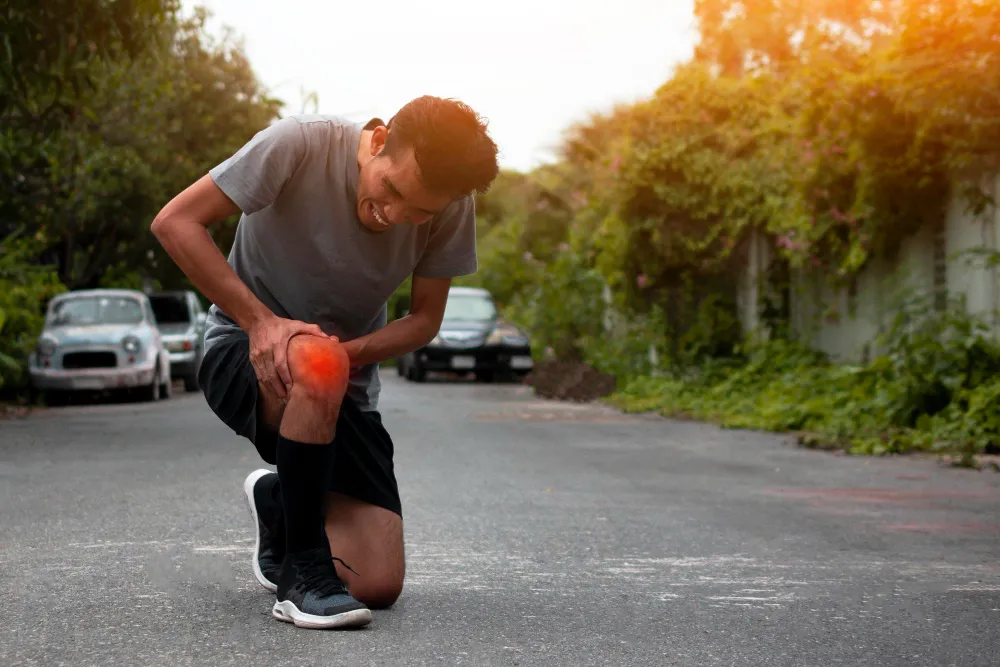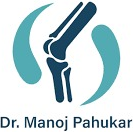Knee Joint Injury Treatment in Nagpur
Expert Knee Care & Advanced Treatment Solutions for Pain Relief and Mobility
What is Knee Joint Injury Treatment
The knee joint is one of the most crucial and complex joints in the human body, bearing the weight of our movements and daily activities. Knee joint injuries can occur due to accidents, sports activities, aging, or medical conditions like arthritis. If left untreated, they can lead to chronic pain, reduced mobility, and long-term complications. Timely intervention and expert care are essential to prevent further damage and restore full knee function.
For expert knee joint injury treatment in Nagpur, Dr. Manoj Pahukar offers specialized care with advanced diagnostic and treatment solutions tailored to each patient’s needs.

Common Causes of Knee Joint Injuries
Knee joint injuries can arise from multiple internal and external factors that put stress on the joint. Understanding these causes is important for prevention, early diagnosis, and timely treatment. Many of these factors are related to lifestyle, accidents, or age-related wear and tear, making awareness essential for protecting long-term knee health.
Knee injuries can result from various factors, including:
- Sports Injuries - Sudden twists, falls, or direct blows while playing sports.
- Accidents & Trauma - Road accidents or falls causing fractures or ligament tears.
- Overuse & Repetitive Strain - Excessive physical activity leading to wear and tear.
- Degenerative Conditions - Arthritis and osteoporosis affecting joint function.
- Obesity & Weak Muscles - Excess weight puts stress on the knee joint.
Early recognition of these causes helps in preventing severe complications and maintaining better joint health.
Types of Knee Joint Injuries
Knee joint injuries can affect different structures within the joint, ranging from ligaments and tendons to cartilage and bones. Each type of injury presents unique symptoms and requires specific treatment approaches. Identifying the exact type of injury is crucial for ensuring the right care and preventing long-term damage.
Ligament Injuries
- ACL, MCL, PCL, and LCL tears are caused by sudden movements or high-impact sports. These injuries often result in instability and severe pain, especially during physical activity. Proper treatment is essential to restore stability and prevent further complications.
Meniscus Tear
- Damage to the cartilage that cushions the knee joint. A meniscus tear can cause locking, swelling, and reduced mobility, often requiring medical or surgical intervention for recovery.
Patellar Dislocation
- When the kneecap moves out of its normal position. This condition leads to pain, swelling, and difficulty in movement, and may recur without proper treatment or strengthening exercises.
Fractures
- Broken bones in or around the knee, including the femur, tibia, or patella. Fractures can severely impact mobility and usually require immobilization or surgical fixation for healing.
Tendon Injuries
- Inflammation or rupture of tendons around the knee. These injuries often develop due to overuse and can cause persistent pain, requiring rest, therapy, or surgical repair.
Bursitis
- Swelling of the fluid-filled sacs that cushion the knee joint. Bursitis can cause tenderness and discomfort, making daily activities challenging without treatment.
Symptoms of Knee Joint Injuries
Recognizing the symptoms of a knee joint injury at an early stage is essential for timely treatment and faster recovery. These signs often indicate underlying damage to the ligaments, tendons, cartilage, or bones of the knee. Ignoring them may lead to worsening of the condition and long-term complications.
- Persistent pain and tenderness
- Swelling and stiffness
- Difficulty in bending or straightening the knee
- Instability or weakness in the knee
- Popping or clicking sounds
- Limited mobility and difficulty in walking
Advanced Knee Joint Injury Treatments by Dr. Manoj Pahukar
Knee injuries can vary from mild sprains to severe ligament tears or fractures, and each requires a unique treatment approach. Dr. Manoj Pahukar provides advanced, personalized care using both non-surgical and surgical options. The goal is to restore knee function, reduce pain, and help patients return to their normal activities safely.
Non-Surgical Treatments
Medications
- Pain relievers, anti-inflammatory drugs, and corticosteroid injections. These help control inflammation, reduce discomfort, and provide temporary relief during recovery.
Physiotherapy & Rehabilitation
- Strengthening exercises to improve mobility and reduce pain. Rehabilitation plays a key role in restoring muscle strength and improving joint flexibility.
Knee Bracing & Supports
- External support to stabilize the knee. Braces protect the injured structures and prevent further strain during movement.
Platelet-Rich Plasma (PRP) Therapy
- An advanced regenerative treatment to promote healing. PRP uses the patient’s own blood components to accelerate natural tissue repair.
Lifestyle & Dietary Modifications
- Weight management and nutrition guidance to protect joint health. Making healthy changes reduces pressure on the knees and supports long-term joint strength.
Surgical Treatments
Arthroscopic Knee Surgery
- Minimally invasive surgery to repair damaged tissues. This approach allows faster healing, smaller incisions, and minimal scarring.
Ligament Reconstruction (ACL/PCL/MCL Repair)
- Restoring stability in case of ligament tears. Reconstruction helps patients regain movement and return to sports or daily activities.
Meniscus Repair
- Surgical correction of meniscus tears to prevent long-term damage. Repairing the meniscus preserves knee cushioning and prevents arthritis development.
Knee Replacement Surgery
- For severe joint damage due to arthritis or trauma. This procedure replaces the damaged joint with an artificial implant for pain-free mobility.
Why Choose Dr. Manoj Pahukar for Knee Injury Treatment in Nagpur?
When it comes to knee joint injuries, expert care and precision make all the difference in recovery. Dr. Manoj Pahukar combines advanced medical expertise with a compassionate, patient-first approach to ensure the best outcomes. His focus on modern techniques and personalized treatments helps patients return to mobility and comfort faster.
- Highly Experienced Orthopedic Surgeon - Specialized in knee joint injuries and treatments.
- State-of-the-Art Technology - Advanced diagnostic tools for precise evaluation.
- Minimally Invasive Surgery - Faster recovery and reduced hospital stay.
- Comprehensive Rehabilitation Plans - Ensuring a full return to daily activities.
- Patient-Centered Approach - Personalized treatment tailored to individual needs.
Recovery & Post-Treatment Care
Recovery after a knee injury is just as important as the treatment itself. Proper rest, rehabilitation, and lifestyle changes ensure long-term knee health and prevent future complications. Following the recommended care plan helps patients regain strength, flexibility, and confidence in movement.
Rest & Protection
- Limiting activities to allow healing. Adequate rest gives the injured knee time to recover and prevents further damage. Using braces or supports may also help in the early stages.
Rehabilitation Exercises
- Guided physiotherapy to strengthen the knee. Tailored exercises improve flexibility, rebuild muscle strength, and restore joint stability.
Regular Follow-Ups
- Monitoring progress and adjusting treatments as needed. Follow-up visits allow the doctor to track healing and make changes in therapy or activity levels as required.
Preventive Measures
- Wearing proper footwear, avoiding excessive strain, and maintaining a healthy weight. Simple lifestyle changes reduce stress on the knee joint and lower the chances of reinjury.
Regain Strength and Mobility in Your Knee
Get expert care from Dr. Manoj Pahukar in Nagpur to restore movement and live pain-free.
Frequently Asked Questions
How do doctors diagnose a knee joint injury?
Diagnosis usually involves a physical examination, medical history review, and imaging tests such as X-rays, MRI, or CT scans to determine the extent and type of injury.
Can knee joint injuries heal on their own?
Minor sprains or strains may heal with rest and self-care, but more serious injuries like ligament tears or fractures usually need medical attention and treatment.
What is the recovery time after a knee injury?
Recovery depends on the severity of the injury. Mild cases may heal in a few weeks, while severe ligament or cartilage damage could take several months with rehabilitation.
When should I see a doctor for knee pain?
You should consult a doctor if knee pain is persistent, accompanied by swelling, instability, locking, or if it prevents you from performing daily activities.
Is surgery always required for knee injuries?
No, not all knee injuries require surgery. Many conditions can be managed with physiotherapy, medication, rest, and lifestyle modifications. Surgery is considered only in severe cases.
Can knee injuries increase the risk of arthritis?
Yes, untreated or repeated knee injuries can increase the risk of developing osteoarthritis later in life due to damage in the cartilage and joint surfaces.
What kind of exercises help in recovery from a knee injury?
Strengthening exercises for the quadriceps, hamstrings, and calf muscles, along with flexibility training and low-impact activities, help in recovery under a physiotherapist’s guidance.
How can I prevent future knee injuries?
Maintaining a healthy weight, wearing supportive footwear, warming up before activities, and strengthening leg muscles are effective ways to reduce the risk of future injuries.

